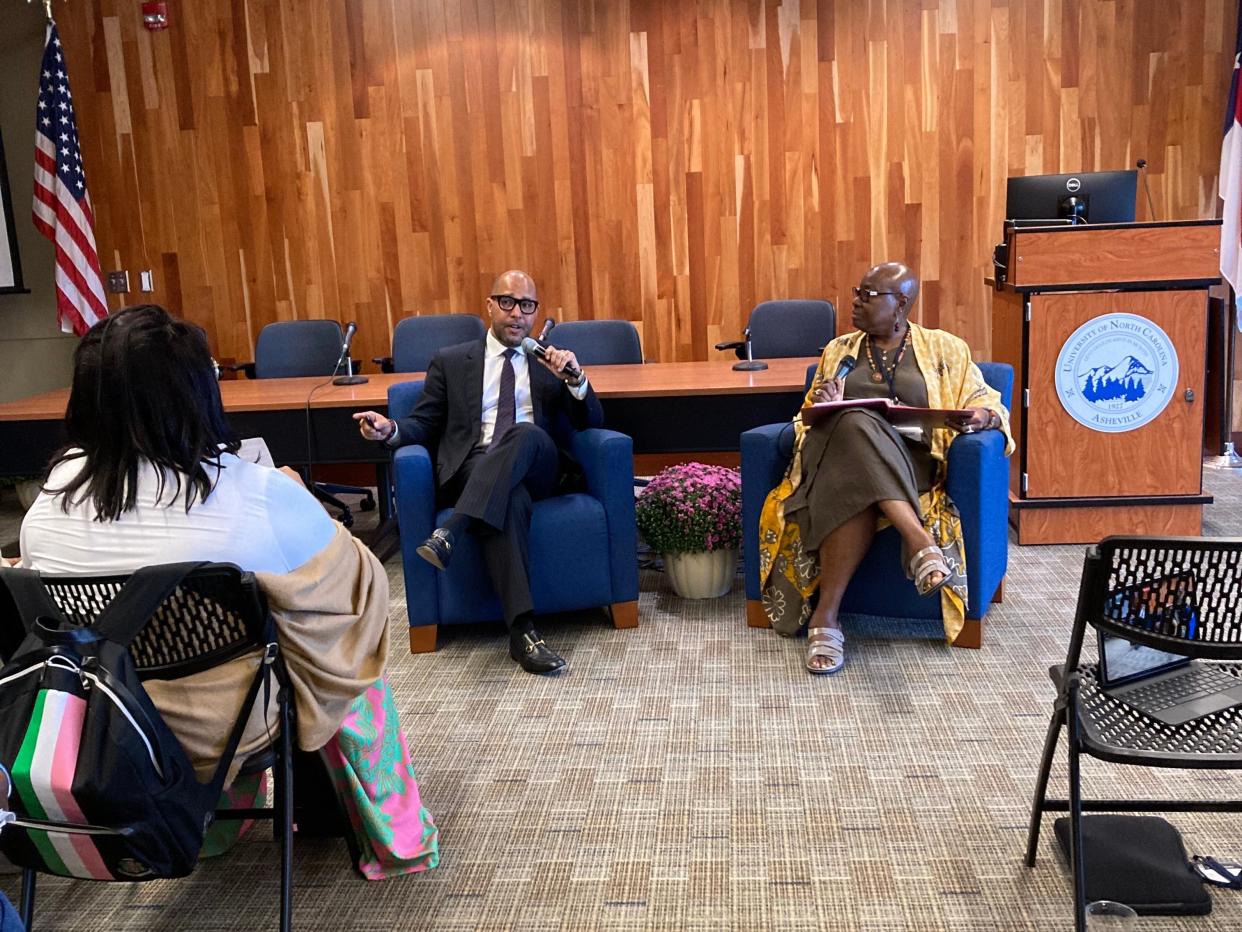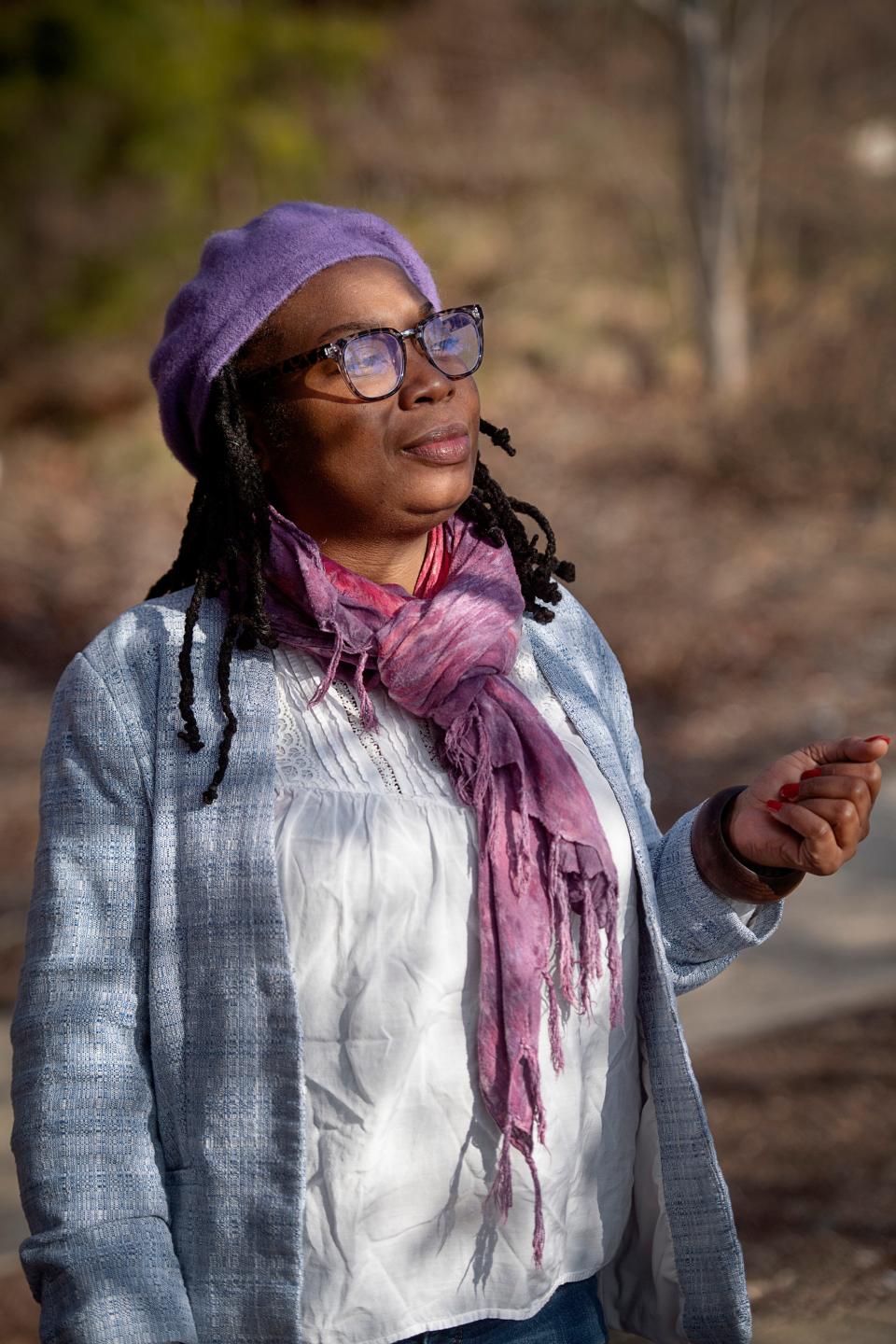What has been achieved with Asheville reparations? Summit encourages participation

ASHEVILLE - In his keynote speech for Asheville and Buncombe County's first Reparations Summit, hosted at UNC Asheville, history-making attorney George Fatheree told the story of Bruce's Beach.
Though it centered around beachfront property on the Southern California coast, thousands of miles from Asheville and its own historic reparations process, the narrative of Willa and Charles Bruce resonated with the sold-out room. It was a familiar one.
Fatheree is most notably recognized for securing the landmark return of the Bruces' property to their descendants, nearly 100 years later, which he said marks the first time in U.S. history that the government has returned property taken by racially motivated eminent domain.
He named exclusionary zoning, redlining, eminent domain and urban renewal as just a few ways Black Americans have historically been denied generational wealth.
In Asheville — home to one of the largest urban renewal projects of its kind in the Southeastern United States, a program of the 1970s and '80s that devastated Black neighborhoods and businesses — awash with gentrification and spiking home prices, there were many people in the room carrying similar stories.

'We lost everything. Can you help us?'
After the return of the Bruces' land in June 2022, Fatheree said he was inundated with emails and phone calls. The message was largely the same: "We lost everything. Can you help us?"
When asked if the story of Bruce's Beach is a model for reparations, he said it is one possible model, but an inadequate one.
“What haunts me really is the immeasurable magnitude of what we lost as a community," he said.
It wasn't just one strategy that was used to deprive Black people from owning property and building wealth, he said, but a multitude, at every level of government. An abundance of strategies for restitution, reparations and restoration must follow.
"The reason that things are the way they are today is because after more than three centuries of chattel slavery, our country has engaged in a systematic and systemic process intentionally designed and implemented to deprive and deny Black Americans the right to acquire property, to build wealth and transfer that wealth to the next generation."
More: Asheville reparations: Group selected to perform city, county audit with $174K contract
Defining reparations
This was the kickoff to the Oct. 7 summit at UNCA's Sherill Center, which featured panels from the city and county's Community Reparations Commission, a 25-member board that first met in April 2022, tasked with making recommendations to Asheville and Buncombe County for repairing damage caused by public and private systemic racism.
The 180-person meeting room was sold out, said Buncombe County spokesperson Lillian Govus, and 62 vendors and community partners were set up around the perimeter of the building's arena. The Reparations Summit was hosted by the city, county and the UNCA Department of Education and Africana Studies program.
Dwight Mullen, reparations commission chair, opened the morning with a reminder that Asheville is "one of the most prominent reparations movements afoot right now," faced with the same questions that efforts before them have also battled: untangling the vocabulary, the language and the relationships to create meaningful movement around land, money and accountability.
"It's not reparations without it," he said. “It's a difficult conversation, and I'm so proud to take part in it. ... Now it’s time to make amends. You want a definition of reparations? Make amends.”
Though the full commission meets monthly, members have also broken off into five focus areas: criminal justice, economic development, health and wellness, education and housing. The groups will make recommendations to the commission and, if approved, will move them forward to the city and county for consideration.
Though the energy in the room Oct. 7 was optimistic, the process has not been without challenges. The commission has seen the departure and replacement of its project manager, staff turnover, an extended timeline and the resignation and reappointment of several commission members. Though project closeout is slated for April, there are talks of again extending the timeline.

Tiffany De'Bellott, a member of the commission, said she's proud of the process, and that serious work is underway "mapping out" recommendations that will guide the city and county forward.
"When you hear word on the street that the commission isn't doing anything, or we're all over the place, lean in with your voice. Bring your body into these spaces. Because that is not true," De'Bellott said. "This is a process, a lengthy one, that truly, because of what we're doing ... they may not want to us to succeed. We are doing more than what you think we are."
She was on the first of two panels, representing the education focus area, where much of the afternoon's discussion lingered.
Chris Gordon, also with the education focus group, said they have at least eight recommendations in the works, covering issues from school suspension — in Asheville City Schools, recent data showed Black students experience a far higher rate of suspension than white students, despite making up less of the student population — to school climate, Black teacher recruitment and retention, internship programs and a permanent reparations accountability taskforce.
"We've looked at what we thought were the major problems and major harms in the system," Gordon said, "and tried to come up with ideas and redress each one of those."
Want to get involved?
The Community Reparations Commission meets at the Harrah's Cherokee Center on the third Monday of each month at 6 p.m. open to the public. Meetings are also streamed live on the city's YouTube page and the county's Facebook page.
The 2023 schedule for each impact focus area can be found at http://bit.ly/3rKnBf5.
More: What is reparations? 17 months in, Asheville board is still struggling to define itself.
More: State of Asheville: Mayor talks restoring core services, public safety at CIBO
Sarah Honosky is the city government reporter for the Asheville Citizen Times, part of the USA TODAY Network. News Tips? Email shonosky@citizentimes.com or message on Twitter at @slhonosky. Please support local, daily journalism with a subscription to the Citizen Times.
This article originally appeared on Asheville Citizen Times: Reparations Summit: What's new with Asheville's historic process?

